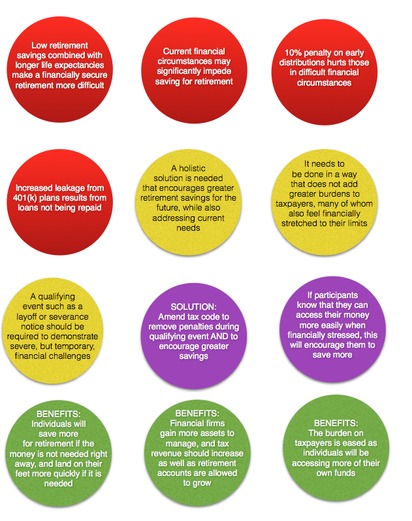|
According to the Investment Company Institute (ICI), assets in retirement plans plans edged up to a record $23 trillion, with defined contribution (DC) plans comprising about $5.9 trillion. IRAs continue to show growth as well, reaching $6.5 trillion as of 12-31-13. Plan activity remained relatively quiet, with only 3.5% of plan participants taking a withdrawal. Only 2.7% stopped contributing. to their DC plan. Asset allocation changes to account balances and contributions were minimal. About 18% of participants had a plan loan, consistent with recent years, although higher than five years ago. Defined benefit (DB) plans even had a modest increase, from $2.7 trillion at year-end 2012 to $3.0 trillion at year-end 2013.
0 Comments
 Click on image to link to blog entry Click on image to link to blog entry The TIAA-CREF Institute has released an interesting look into the financial attitudes and activities of the Millennial population, also known as Gen Y. According to College-Educated Millennials: An Overview of Their Personal Finances, for the most part, Gen Y tends to be both optimistic and worried at the same time. Most Gen-Yers have a checking or savings account, and more than half have a self-directed retirement account, while just about half own their own home. So although this might suggest that Gen Y is financially knowledgeable, many still are challenged with high debt levels from student loans, mortgages, and car loans. Even for those covered by a retirement plan, 50% acknowledged that they have too much debt. Three in ten (30%) indicated that they would have difficulty coming up with $2,000 if they had a financial emergency within a month. While Gen Y seemingly is doing well in terms of asset ownership, the authors report that this population segment also tends to be lacking in financial education. They urge the following solution: "Policies aimed at improving financial literacy could help Gen Y minimize the costs incurred in managing debt, improve personal financial safety nets, and fortify both short-term and long-term financial stability and security." I think the recognition of the need to focus on both short-term and long-term financial stability is very valuable in the discussion of how to resolve the shortfalls in retirement savings. In too many cases, it seems that the focus has been more of an "either/or" choice. In other words, telling people that they need to save more for retirement is all well and good, but there has to be recognition that this effort does not occur in a vacuum. There are many short-term challenges as well. I recently posted a blog entry that would retool this provision to instead both encourage retirement savings and be available for short-term financial challenges. One thought that I keep coming back to is what if there were a way to contribute more to a 401(k) plan and have better access to the funds to meet those short-term financial challenges. As it now stands, the 10% early distribution penalty punishes individuals just at the time of financial difficulty, rather than encouraging them to get back on their feet. When it was enacted, it was most likely well-intended as a way to ensure that money intended for retirement is in fact available for retirement. The problem is that for many people, financial challenges might not await retirement - the "rainy day" is more immediate. The gist of the idea is that if participants who potentially will have financial stress know that if they contribute more to their 401(k), but will also have access to the funds in a financial emergency without penalty, while also being encouraged to "pay it forward" as they return to a better financial state, then this will increase retirement readiness and give peace of mind to those who are addressing both short-term and long-term needs. 4/4/2014 0 Comments Recent Blog HighlightsAs we move further into Spring and the opening of the baseball season, I thought this would be a good opportunity to highlight links to some of the blog posts since the beginning of the year:
One of the more interesting findings in EBRI's annual Retirement Confidence Survey (RCS) is that there is a disconnect between when individuals expect to retire and when they actually retire. EBRI has been tracking this for over two decades. Back in 1991, only 11% of workers thought that they would retire after age 65.Today, one in three (33%) expect to retire after age 65 and 10% don't expect to retire at all. Those expecting to retire before age 65 declined from 50% in 1991 to 27% in 2014. Despite this expectation, the actual median retirement age has stayed relatively stable at 65 throughout the 1991-2014 period. The primary reasons cited for the changing expectations are the poor economy, inability to afford retirement, and a change in employment status. Many retirees left the workforce earlier than expected due to negative reasons such as health problems or disability, as well as for financial reasons.
The major implication of these findings is that individuals will need ways to overcome shortfalls that result from longer life expectancies measured up against fewer savings years. Although people think that they will work longer, that doesn't appear to be the reality. |
Blog Author - Ken FelsherWith over 25 years of writing, editing, and research experience. I enjoy sharing with my readers my love of working with content on a variety of subjects. CategoriesAll 401(k) 402(g) Boomers Catch-up DB Dc Deferral Limit Defined Benefit Defined Contribution ERISA Healthcare Participation Pension Professionally Managed RCS Retirement Retirement Confidence Tax Code Vanguard Women Working Archives
March 2015
|
